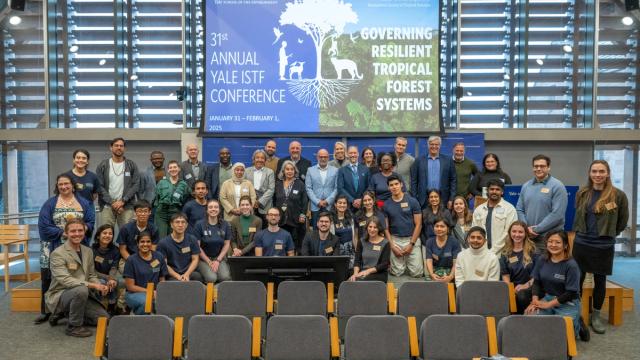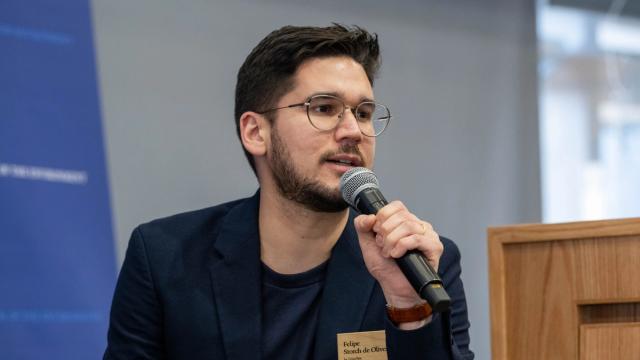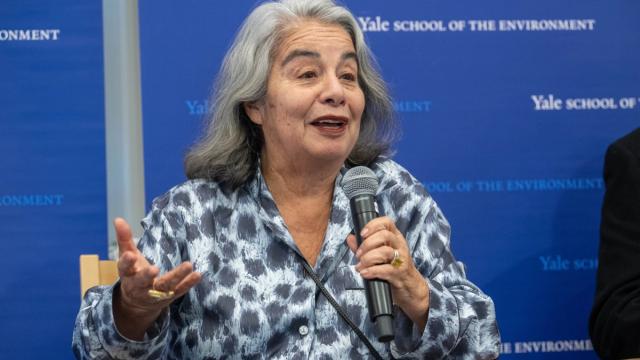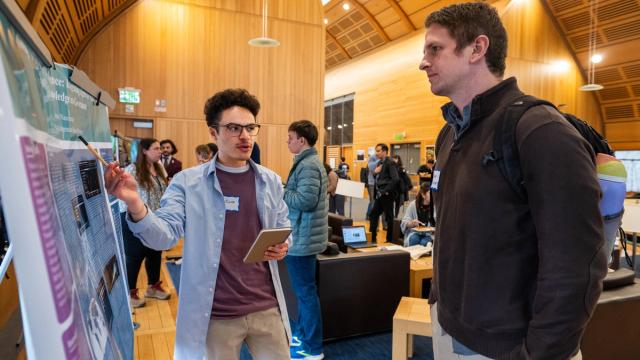SDSN Science Panels Featured at Yale Tropical Forestry Conference
On January 31 and February 1, 2025, the UN Sustainable Development Solution Network’s (SDSN) Science Panel for the Amazon (SPA) participated in the 31st Annual Conference of the Yale Chapter of the International Society for Tropical Foresters (ISTF). The conference, held at the Yale School of the Environment (YSE), featured leaders from around the world to discuss “Governing Resilient Tropical Forest Systems.”
This year’s event was a special edition of the ISTF, with YSE celebrating its 125th year of “Leadership, Innovation, and Impact.” With these themes in mind, the conference convened university professors leading current tropical forest research, Indigenous leaders from tropical forest communities, and high-level officials from notable institutions dedicated to science communication and tropical forest conservation, including the Global Environmental Facility (GEF), Mongabay, and the Rainforest Alliance.
SPA Youth Advisory Committee (YAC) member and YSE student, Felipe Storch de Oliveira, was one of the Co-Chairs of the event. He led the organization of the conference and along with fellow Co-Chair, Ananya Rao, delivered the opening and closing remarks.
Storch de Oliveira noted that his YAC experiences were directly tied to his work with the ISTF. “As a Co-Chair of the conference and a member of the SPA Youth Advisory Committee, I saw a lot of interconnection between the themes we discuss in both spaces,” he stated. “For example, we discuss the need to break barriers and conduct interdisciplinary research and collaborate. We also discuss how to connect scientific knowledge to effective solutions to engage more Indigenous peoples and local communities.”
Emma Torres, the SDSN’s Vice President for the Americas and Strategic Coordinator for both the Science Panel for the Amazon and the Science Panel for the Congo Basin, was a keynote speaker at the conference.
Torres and the other conference participants appeared in a panel on “Leadership for Forest Governance.” She was joined by Rhett Butler, Founder of Mongabay, Santiago Gowland, CEO of the Rainforest Alliance, and Garo Batmanian, Director General of the Brazilian Forest Service. The panel, facilitated by Storch De Oliveira and Rao, discussed the key qualities of an environmental leader and advice for early career environmentalists and foresters. Discussions touched on being a good listener and effective communicator and being enthusiastic without being dogmatic.
After the panel, Torres delivered her keynote address, titled “Science-based Solutions for Tropical Forests’ Conservation and Sustainable Development: Amazon, Congo, and Borneo Science Panels.” She spoke about the importance of advancing, synthesizing, and communicating scientific knowledge on tropical forests, and the importance of the year ahead for forests worldwide. “2025 provides unique opportunities for governments, civil society, Indigenous peoples, local communities, financial institutions, and other stakeholders to advance science-based solutions to conserve tropical forests and sustainable development,” she said.
The Science Panels for the Amazon, the Congo Basin, and Borneo contribute to the governance of tropical forest systems by advancing the most up-to-date and comprehensive science of their respective biomes. Each panel plans to unveil a detailed assessment report of the ecological state and policy needs their region faces at the COP30, set to happen in Belém, Brazil in November 2025.
In addition to the keynote speakers, the event offered a diverse program throughout its two days. The panel entitled “Nature-Based Solutions: Forests for the Future and Holistic Pathways to Thriving Ecosystems” featured Science Panel for the Congo Basin Steering Committee Member Dr. Elsa Ordway, Assistant Professor in the Department of Ecology and Evolutionary Biology at the University of California, Los Angeles. Dr. Ordway discussed “PANGEA,” a tropical forest scoping project designed to work with NASA to understand how different forests react to change.
Also in attendance was YSE’s Associate Professor of Ecosystem Carbon Capture and SPA member, Dr. Paulo Brando. Dr. Brando was joined by his lab of students, some of whom presented their research during the conference’s poster sessions.
The poster sessions consisted of presentations of students’ scientific research on, for example, how forest edge temperatures change based on the crops planted nearby and how acoustic monitoring can track elephant populations in Cameroon. SPA YAC Member Gustavo Nascimento also presented his research project, entitled “Pathways to Forest Resilience: Integrating Rights to Nature and Traditional Knowledge into Governance,” examining the progress in conservation made by places that have enshrined rights to nature as a legal concept.
Beyond speeches, panels, and poster sessions, the conference also included interactive discussions, “speed talk” video presentations, and a “TGIF!” (Thank God I’m a Forester!) social event.
In his closing remarks, Storch de Oliveira recited the poem “Arco e Flecha” (“Bow and Arrow”) by Brazilian Minister of the Environment Marina Silva. “I am the bow, I am the arrow,” he read. “Seek the best of me and you will get the best of me. I’ll give the best of me wherever the world needs me.” He encouraged all conference attendees to give the best of themselves wherever the world needs them.



